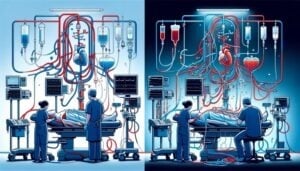
Relationship between the Pre-ECMO and ECMO Time and Survival of Severe COVID-19 Patients: A Systematic Review and Meta-Analysis
This meta-analysis explores the impact of pre-ECMO timing and ECMO duration on the survival of severe COVID-19 patients, analyzing 54 studies involving 13,691 patients. Results indicate significant differences in pre-ECMO intervals between survivors and non-survivors, without a direct linear relationship between longer pre-ECMO times and mortality risk. The study highlights the need for further research to understand the optimal timing for ECMO initiation in severe COVID-19 cases, as current evidence does not conclusively link extended pre-ECMO periods with decreased survival rates.










